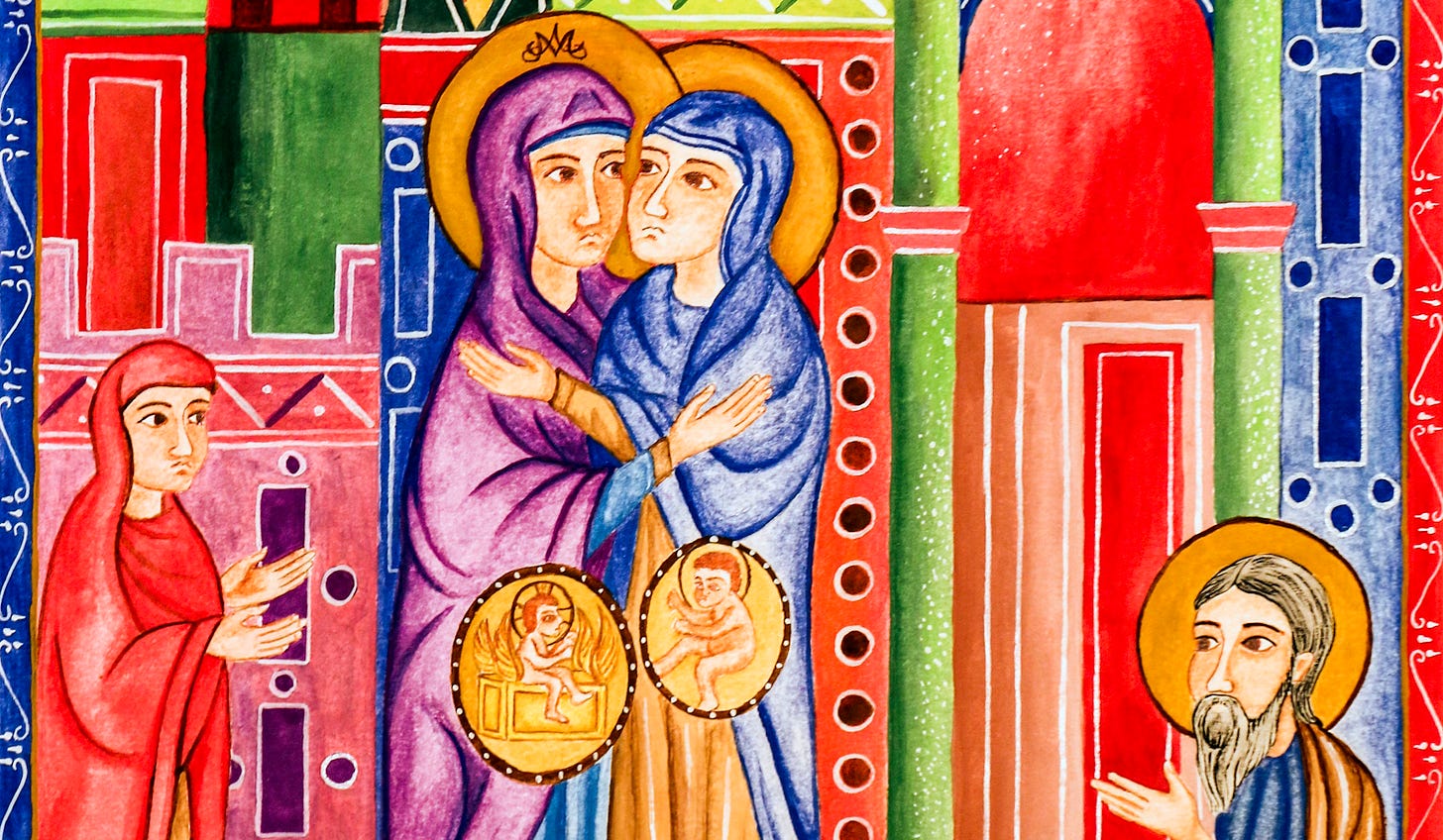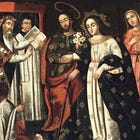How the Visitation made St John the Baptist the first to adore Christ
The power of Christ’s presence within Mary broke the chains of original sin for St John the Baptist, and begins the work of salvation.

The power of Christ’s presence within Mary broke the chains of original sin for St John the Baptist, and begins the work of salvation.
Editor’s Notes
In this part, Fr. Coleridge tells us…
How Mary’s greeting at the Visitation conveyed Christ’s power to both St Elizabeth and her child.
That the mystery reveals Christ’s hidden majesty and the real effects of grace even before birth.
Why St John’s leap of joy is the first outward homage ever paid to the Incarnate Word.
He shows us that even in the womb, Christ calls and transforms souls by his mere presence.
The Visitation
The Nine Months
Chapter VIII
St. Luke i. 39-56.
Story of the Gospels, § 5
Burns and Oates, London, 1885
Why didn't Our Lady tell Saint Joseph about the Incarnation before the Visitation?
How the Visitation made St John the Baptist the first to adore Christ
The salutation of Our Lady
The salutation of our Blessed Lady to her cousin was probably the ordinary greeting of love and affection, without more than might show that she was aware of the great blessing which had been vouchsafed to St. Elisabeth. At least we have no mention in the Gospel account of anything more.
But the words of Mary, who had within her womb the Incarnate God, were words of power as well as simply significative of the thoughts or goodwill of the speaker.
Thus, the moment that they sounded in the ears of St. Elisabeth, two wonderful outpourings of grace followed.
The one of them affected the infant Baptist in his mother's womb, while the other wrought wonderful effects in his mother herself. St. Elisabeth was the first to hear the blessed words of the salutation of Mary, but the effect of grace appears to have followed first in her infant son.
The words struck on the ears of the mother, but their power first reached the soul of St. John. Their effect was his sanctification in the womb, that gift which had been predicted for him by St. Gabriel, when he was commissioned to announce to his father Zachary the conception of the Precursor.
Gabriel had said that he was to be filled with the Holy Ghost even from his mother's womb. The effect which now followed is dwelt on by many of the holy writers of the Church. Up to that moment the soul and body of the Baptist had shared the common lot of the souls and bodies of all infants born of the race of Adam.
The soul had been joined to the body at the instant of conception, but the life which they had shared together had been the usual life of obscurity, slow advance in natural growth, the intellectual faculties in germ rather than in activity, with only that kind of animal consciousness which is usual in such cases. They lay under the ban of original sin.
The prayers of his holy parents had risen continually for St. John, ever since his conception, but the moment of his delivery from the common state of distance from God had not yet come. He was a holy child, if his parents merits could have made him holy, but no merits of theirs could roll away for him the cloud which hung over his existence on account of his descent from Adam.
Effect of Our Lady’s voice
The voice of our Blessed Lady, which conveyed the power of the Divine Infant Who lived in her womb, altered the whole state of the blessed child of Elisabeth.
When St. Peter lay in his prison in Jerusalem, the holy text tells us that "an Angel of the Lord stood by him, a light shined in the room, and striking Peter on the side, he raised him up, saying, Arise quickly, and the chains fell off from his hands."1
This may be taken as a kind of image of what took place in the womb of St. Elisabeth.
The voice of the Mother of God was as the Angel who stood by St. Peter. The room was filled with light. That is, the whole existence of the child, dark and sad and sombre before with the overhanging cloud of the displeasure of God, or at least of the absence of His grace, was full of light and joy and life.
The chains fell off, the bonds of original sin, the imperfections and penalties of the state of estrangement from his Creator, the miseries of an intelligence merged in torpidity and a will fettered by impotence, a mind clouded with ignorance and a heart in which there had been as yet no spark of love. The Angel said to Peter, "Arise quickly," and the arising of the soul of the child of Elisabeth was rapid indeed.
Sanctification of St John
He was at once awakened by Divine grace to the full use of his faculties, and the streams of grace, bearing on their bosom the virtues, theological moral and infused, and the gifts of the Holy Ghost, poured themselves into and over his soul.
He understood his God, he knew his own relations to Him, the end for which he was made, the office he was to discharge.
He broke out at once into the full exercise of faith and hope and charity. He knew the presence of our Lord, he knew Who He was, and what was His work in the world for his salvation and the salvation of all mankind.
The change which in others is gradual and progressive, from one point of intelligence to another, was made in him in a moment. He at once became perfect man in the use of his intelligence and will, and in the knowledge of Divine things and of his own duties.
The sun rose on him in a moment, without any preceding twilight. And at the presence of his Lord and Saviour, he, the first of all as far as we know, except the Blessed Mother, manifested by outward sign his joy and love and reverence, and homage. He leapt in the womb for joy.
Illumination of St Elisabeth
At the same time another great operation of grace was going on in the soul of the blessed Elisabeth herself.
It is commonly said by the Fathers who have spoken on this mystery, that the Child was first illuminated and then the mother, and that the Divine illumination passed from the soul of the Child to the soul of the mother, as the power of grace which was exerted in their favour passed first from the Child in the womb of Mary, and then by means of her voice reached the soul of St. John and then the soul of Elisabeth.
The Scripture does not tell us the order of these sanctifications, though the opinion of the Fathers is enough for the authority of the account just given.
Elisabeth was filled with the Holy Ghost. She received the full illumination needed for her comprehension of the mystery and for her own witness thereto.
She may have seen in her cousin, when she first embraced her, nothing more than the marvellously gracious and unearthly maiden whom she may have seen not long before in the precincts of the Temple. She may have known something of her wonderful gifts from her birth.
She may have been present at her presentation in the Temple. She may have conversed about her with the holy Joachim and Anna. She may have marvelled what was to be the destiny of one so singularly marked out for great things by the circumstances of her birth and childhood.
She may have known of her marriage to the blessed Joseph, but she could have had no thought of the dignity to which she had now been raised. She might have welcomed her with joy and love, but without veneration.
But as soon as the voice of her salutation sounded in her ears the infant leaped in her womb for joy.
What she knew
These simple words contain the whole of what we have been saying about the sanctification of the Baptist, and they also signify the cause of the further grace now bestowed on his mother.
Elisabeth understood by a Divine light, what had taken place. She understood the mystery of the Incarnation, the fulfilment of the prophecies, the beginning of the accomplishment of the salvation of the world.
She knew that our Lord was there present in the womb of His mother. She understood the leaping of her babe in her own womb as his greeting and joyous homage to the Incarnate King, and that it was no simply natural or involuntary movement, but the deliberate expression of joy, which signified that he had so much at which to rejoice, in the accomplishment in himself, at that moment, and by virtue of the salutation of our Lady, of the promise of spiritual deliverance and elevation which had been made to his father concerning him at the time of the announcement of his future conception.
More than this, the words of St. Elisabeth show also that she had then revealed to her the details of the Annunciation itself as made by the Angel to Mary. Her words take up the very words of the salutation of Gabriel, and complete them.
The Angel had stopped short at the declaration of the blessedness of Mary, before the Incarnation had taken effect. Elisabeth continues, in the words which the Church has ever since used, to declare the blessedness of the fruit of the womb of Mary, after the Incarnation had taken effect.
Subscribe now to never miss an article:
The Visitation
Why didn't Our Lady tell Saint Joseph about the Incarnation before the Visitation?
How the Visitation made St John the Baptist the first to adore Christ
Here’s why you should subscribe to The Father Coleridge Reader and share with others:
Fr Coleridge provides solid explanations of the entirety of the Gospel
His work is full of doctrine and piety, and is highly credible
He gives a clear trajectory of the life of Christ, its drama and all its stages—increasing our appreciation and admiration for the God-Man.
If more Catholics knew about works like Coleridge’s, then other works based on sentimentality and dubious private revelations would be much less attractive.
But sourcing and curating the texts, cleaning up scans, and editing them for online reading is a labour of love, and takes a lot of time.
Will you lend us a hand and hit subscribe?
Follow our projects on Twitter, YouTube and Telegram:


